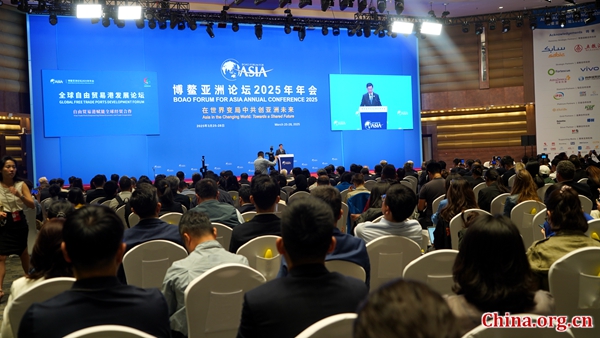
 0 Comment(s)
0 Comment(s) Print
Print E-mail China.org.cn, March 27, 2025
E-mail China.org.cn, March 27, 2025

A panel on "Global Free Trade Port Development" is held during the 2025 Boao Forum for Asia (BFA) Annual Conference in Boao, south China's Hainan province, March 25, 2025. [Photo/China.org.cn]
Hainan Free Trade Port (FTP) has expanded its global reach by forming partnerships with 38 free trade zones (FTZs) across Asia, Africa, Europe and Latin America, establishing a robust international network since its 2018 launch.
This milestone was highlighted during a panel on "Global Free Trade Port Development" at the 2025 Boao Forum for Asia (BFA) Annual Conference in Boao, south China's Hainan province, on Tuesday.
Chinese Vice Premier Ding Xuexiang, also a member of the Standing Committee of the Political Bureau of the Communist Party of China Central Committee, emphasized the need for solid efforts to advance the development of Hainan FTP during his inspection tour from March 24 to 25, stressing its role as a gateway for China's opening up in the new era.
China's government work report this year reaffirmed its commitment to accelerating the implementation of key policies related to Hainan FTP, emphasizing the need to improve the quality and performance of pilot FTZs and give them more authority to implement reforms.
Ban Ki-moon, former U.N. secretary-general and now BFA chairman, highlighted the pivotal role of FTPs in global commerce.
"With the highest level of trade opening up, FTPs come closest to achieving the ultimate goal of trade and investment liberalization," he said. "They serve as incubators, pioneers and testing grounds."
BFA Vice Chairman Zhou Xiaochuan reviewed the growth of China's FTZs, noting that since 2013, China has created 22 FTZs, each adapted to meet local economic needs.
Zhou emphasized that Hainan's strengths include its rich ecological resources and strategic location near ASEAN countries, positioning it as a crucial player in the Regional Comprehensive Economic Partnership (RCEP) and potentially in the Comprehensive and Progressive Agreement for Trans-Pacific Partnership (CPTPP).
Hainan's economic performance reflects its rising role in global trade. Statistics from Hainan's "two sessions," the annual meetings of provincial-level lawmakers and political advisors, showed that the province's total foreign trade reached 277.65 billion yuan ($38.22 billion) in 2024, a 20% year-on-year increase. Exports surpassed 100 billion yuan for the first time, reaching 106.22 billion yuan, a 43.5% surge. Trade in goods grew by 20%, while services trade increased by 23.9%.
Hainan Governor Liu Xiaoming confirmed that preparations for Hainan FTP to handle its own customs operations are proceeding as planned, with completion expected by the end of the year.
"Once implemented, Hainan's opening up will be significantly elevated, with stronger policy support, wider economic reach, an improved business environment, enhanced vitality for enterprises and greater benefits for people," Liu said.
Former Chairman of the Cabinet of Ministers of the Kyrgyz Republic Akylbek Zhaparov stressed the importance of open borders, efficient logistics and seamless trade flows. "Free trade ports are crucial in creating these conditions," he said.
Gerry Grimstone, former minister for investment of U.K., emphasized the economic benefits of global trade. He argued that free trade encourages multilateralism by allowing nations to leverage their competitive advantages.
He emphasized that while some countries have retreated from global trade to protect their own interests, it is crucial to continue promoting global trade to secure mutual benefits for all.
Long Yongtu, China's former chief negotiator for entry into the World Trade Organization and former vice minister of Ministry of Foreign Trade and Economic Cooperation, warned that tariffs imposed by some countries are harming trade stability and fairness, even if they don't reflect mainstream trade policies.
"When any major economy engages in trade wars, retaliatory measures from other countries disrupt global trade stability," Long cautioned.
Arancha Gonzalez, former Spanish foreign minister, highlighted FTZs and FTPs as essential tools for overcoming global trade barriers. He explained that they strengthen resilience by facilitating targeted responses to global shocks. Furthermore, they act as testing grounds for innovative business models, offering solutions to reduce costs, improve efficiency and optimize operations.
Go to Forum >>0 Comment(s)